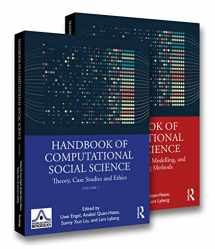
Handbook of Computational Social Science - Vol 1 & Vol 2 (European Association of Methodology Series)
Book details
Summary
Description
The Handbook of Computational Social Science is a comprehensive reference source for scholars across multiple disciplines. It outlines key debates in the field, showcasing novel statistical modeling and machine learning methods, and draws from specific case studies to demonstrate the opportunities and challenges in CSS approaches.
The Handbook is divided into two volumes written by outstanding, internationally renowned scholars in the field. The first volume focuses on the scope of computational social science, ethics, and case studies. It covers a range of key issues, including open science, formal modeling, and the social and behavioral sciences. This volume explores major debates, introduces digital trace data, reviews the changing survey landscape, and presents novel examples of computational social science research on sensing social interaction, social robots, bots, sentiment, manipulation, and extremism in social media. The volume not only makes major contributions to the consolidation of this growing research field, but also encourages growth into new directions.
The second volume focuses on foundations and advances in data science, statistical modeling, and machine learning. It covers a range of key issues, including the management of big data in terms of record linkage, streaming, and missing data. Machine learning, agent-based and statistical modeling, as well as data quality in relation to digital-trace and textual data, as well as probability-, non-probability-, and crowdsourced samples represent further foci. The volume not only makes major contributions to the consolidation of this growing research field, but also encourages growth into new directions.
With its broad coverage of perspectives (theoretical, methodological, computational), international scope, and interdisciplinary approach, this important resource is integral reading for advanced undergraduates, postgraduates and researchers engaging with computational methods across the social sciences, as well as those within the scientific and engineering sectors.


We would LOVE it if you could help us and other readers by reviewing the book
Book review



